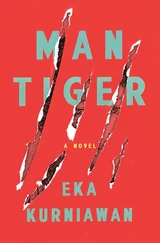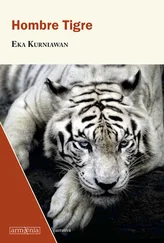“There are still lots of them in the river,” she said casually, “if you guys want more.”
Ever since she was little she had been taught to fear nothing. Her grandfather had taken her boar hunting with the tough guys a few times. She had even been at Mr. Willie’s side when he was rammed by the wild boar that crippled him for life. She knew how to deal with a boar: zigzag, don’t run in a straight line, because a boar doesn’t know how to turn. The tough guys had taught her that, just as they had taught her how to face a crocodile, what to do if a python suddenly coiled around her or if a viper bit her, how to face down an ajak , and what to do if a leech was sucking her blood. She had never actually been threatened by any of those creatures until she had come to Bloedenkamp, but the lessons she learned from the tough guys were always in the back of her mind.
They also taught her mantras to get rid of evil spirits and to guard her safety. She never used them, but it made her happy to know that she could. She knew a Javanese merchant who came on foot from a mountain more than one hundred kilometers away just to sell the Dutch fruit from her garden. It took her four days to get there. She usually spent a night in the warehouse, and Dewi Ayu’s grandmother would give her dinner and a cup of hot coffee, and the next day she would depart on another four-day journey home. In addition to money, sometimes she brought back some hand-me-down clothing. She was never afraid of any kind of jungle beast and Dewi Ayu knew why, it was because she recited mantras.
But Dewi Ayu also didn’t really believe in them, just as she was always confused about the point of praying. Still, while she didn’t believe in prayer, and never did it herself, she’d say to Gerda, “Pray that America wins the war.”
The gossip about America’s victory and Germany’s defeat was spreading by word of mouth throughout the camp. It comforted them a bit, no matter how elusive that hope might be, but the days continued to follow one another, as did the weeks, and the months. Finally the second Christmas arrived, and Dewi Ayu celebrated it that year just to entertain Gerda. She broke a branch from a banyan tree growing in front of the camp’s gate, decorated it with paper ornaments, sang Jingle Bells , and felt very happy to have Ola and Gerda, for a moment forgetting how miserable it was to spend all one’s days in a prison camp.
They started to discuss their plans for when the war was over, however it might end, once they were finally free. Dewi Ayu said she would return to her home, set everything in order, and live just as she had before. Maybe not truly just like before, because maybe the natives would form their own republic and resist the old ways, but she would return to her home and live there. She would be pleased if Ola and Gerda could join her. But Ola thought rationally that maybe the Japanese had already stolen the house and sold it to someone. Or maybe the natives had, and now it belonged to them.
“We can buy it back,” said Dewi Ayu. She told them the secret of the treasure she had left there, even though she didn’t say exactly where it was stored. “Even if the Japanese have already bombed it and all that’s left is a heap of tiles, we can buy it back.” Gerda was really happy to hear such a tale. She was now eleven years old, but she had wasted away and her body hadn’t developed at all in the past two years. But everyone was in the same boat, shrunken and skinny. Dewi Ayu was sure she had lost ten or fifteen kilos of flesh off her body.
“And that’s enough for fifty bowls of soup,” she said with a small laugh.
The real insanity began after almost two full years in the camp, when the Japanese soldiers began making a list of all the women who were between the ages of seventeen and twenty-eight. Dewi Ayu was already eighteen, almost nineteen. Ola was seventeen. At first they thought the list meant they’d be assigned to harder forced labor, until one morning a few military trucks arrived across the river and a handful of army officers boarded the ferry heading for Bloedenkamp. They had already come a number of times, for inspections or to give new rules and orders, and this time the order was to round up all those women between the ages of seventeen and twenty-eight years old. Chaos immediately descended, as the women realized that they were about to be separated from their friends and family.
A number of young girls, including Ola, tried to make themselves up to look like old women, which of course didn’t work. Others ran, hiding in the toilets or climbing up onto the rooftop and crouching there, but the Japanese soldiers found them all. An old woman, who feared she was about to lose her daughter, tried to protest and said if the young women were to be taken then all should be taken. In response, two soldiers beat her black and blue.
Finally all the young women stood in rows in the middle of the yard, shaking in fear while their mothers huddled together in the distance. Dewi Ayu saw Gerda clinging to a post all alone gulping back tears, and beside her Ola didn’t dare look anywhere except down toward her ugly tattered shoes. She heard a number of the girls crying and murmuring prayers. Then the officers came, examining them one by one. They stood in front of each woman, laughing quietly while scrutinizing her body, from the top of her head down to the tips of her toes. Sometimes, to get a better look at her face, they’d lift up her chin with their fingertips.
Then there was a selection. A number of women were separated off to the side and every time a young girl was released, it was like an arrow shooting from the group of girls to the group of mothers. Now only half of them were still standing in the middle of the yard, including Dewi Ayu and Ola, even after the second culling, they both were still in the middle of the yard, powerless pawns in the Japanese soldiers’ ridiculous game. They were called one by one to face an official, who examined them much more minutely with small squinting eyes. That final selection left only twenty girls in the center of the yard clutching one another, but no one dared look at anyone else. These chosen girls — young, pretty, healthy, and strong — were ordered to pack all of their belongings immediately and gather in the camp office. The truck was already waiting to take them away.
“I have to bring Gerda,” said Ola.
“No,” said Dewi Ayu. “If we die, at least she will survive.”
“Or the other way around?”
“Or the other way around.”
They entrusted Gerda to a family that Dewi Ayu had known for a long time. But even so, Ola couldn’t accept the situation and the sisters sat in a corner embracing for very a long time. Dewi Ayu packed their things and helped sort out what would be left behind for Gerda.
Then Dewi Ayu said to Gerda, “Ok, that’s enough, after two years of this boring life, we are leaving for a while to go on a trip. I’ll bring you back some souvenirs.”
“Don’t forget a guidebook,” said Gerda.
“You’re funny, kid,” said Dewi Ayu.
The twenty women swarmed next to the gate, and from the look of it Dewi Ayu was the only one acting as though it would be a pleasant outing. The other young girls stood in confusion and fear, looking back at those they were leaving behind. The officers had gone on ahead, and the women were herded to the ferryboat by a number of soldiers, who pushed and shoved them forcefully. Once boarded, they could still see the prison gates and deep inside people crowded around watching their departure. There were some handkerchiefs waving, reminding everyone of when the Japanese had first taken them from their homes. Now another journey was waiting. But once the ferry began to move, the gate and the view inside vanished. That was when the girls began to wail, drowning out the ferry engine and the barks of the soldiers who were getting annoyed at their whining.
Читать дальше











